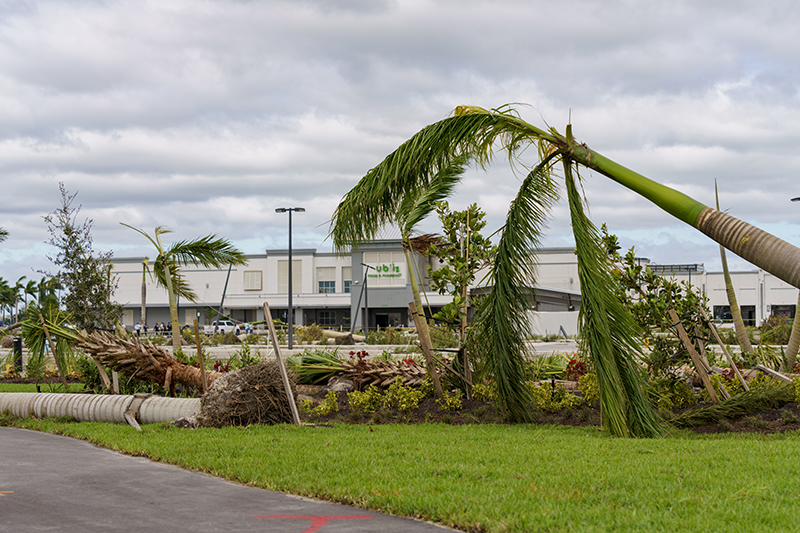
In the last month, two hurricanes have taken lives and caused damage to property in the Southeastern United States. In the aftermath of hurricanes Helene and Milton, glass and fenestration companies in affected areas are trying to map what will likely be a long road to recovery and repair.
Tell us what you need
Let Glass Magazine and the National Glass Association know what you or other affected companies need. Email Norah Dick at ndick@glass.org.
Hurricanes Helene and Milton break records and leave path of destruction
Hurricane Helene made landfall on Sept. 26, 2024, as a Category 4 hurricane near Perry, Florida, with 140 mile-per-hour winds. It is the strongest hurricane on record to make landfall in Florida’s Big Bend region, resulting in the highest storm surge in the Tampa-St. Petersburg, Florida, region in modern records. Southern Appalachia experienced catastrophic flooding, with affected areas spanning the western Carolinas, eastern Tennessee and southwestern Virginia.
Two weeks after Helene’s destruction, Hurricane Milton made landfall at Category 3 strength on the night of October 7, south of Tampa Bay, Florida, moving across central Florida and out into the Atlantic Ocean. In addition to 100-plus mph winds, the storm resulted in 126 tornado warnings, the highest number issued in Florida for one day, with several tornados reported to have touched down in the southern peninsula of Florida.
The glass industry rallies to keep employees and communities safe
Speaking to glass industry leaders a week after Milton made landfall, companies had been focused on employee safety and well-being. In an October 15 interview, Bill Daubmann, president of MY Shower Door, which has locations in Florida and North Carolina, says some employees had just started returning after evacuating from affected areas.
“I have to make sure they're safe and their families are taken care of, and that they're not missing out on paychecks,” he says. “We've increased our paid time-off program so that they don't feel bad about evacuating if they have to, and they'll still get paid.”
Ray Shelton, vice president and chief sustainability and communications officer for YKK AP America, says the company was similarly concerned with caring for employees, especially those near YKK AP’s location in Dublin, Georgia. After learning through the company’s messaging system that many employees in more rural areas were without power and water, the company sent down supplies.
“We made the decision to rent a couple of U-Haul trucks and buy out Costco up here in the Atlanta area [headquarters], where we didn't have damage, and take two loads of what we understood their basic needs were after talking with employees,” including food and clean-up supplies, he says.
Companies have also been helping with relief efforts, both within the glass industry and broader affected areas. Daubmann created a GoFundMe for the owners and employees of Britt and Tilson Glass Co., based in Asheville, North Carolina, whose business and homes were destroyed by Helene.
William Calhoun, president of Clearlight Glass & Mirror, based in Kernersville, North Carolina, drove to Marion, North Carolina, to help clear some of the debris with the help of the local, on-the-ground relief efforts. He says the group effort by glass industry companies, community members, and local religious and community organizations was very heartening. “You feel the tragedy of those impacted, and you feel the community coming together, and this common humanity that binds us together, even when we're in competition … it really allows us to touch each other in ways that are beautiful in a tragedy like this.”
Companies communicate with suppliers as some facilities struggle to reopen
The impact on facilities and businesses was extreme in many affected areas. “There are still roads in Asheville, and even through North Florida, that are decimated with trees down and roads washed out so that you physically can't get there,” says Daubmann. “But it also affects delivery services, so we can’t get our material from our suppliers. UPS and FedEx have been backlogged, holding orders so they can make safe deliveries.”
“For the most part, the industry as a whole, nationwide, it hasn't affected it that much, but locally, where the storms hit, it definitely has,” says Daubmann.
Shelton says that many of their customers’ facilities were closed after the storms, and that YKK AP was staying in close communication with them in regards to receiving shipments. “We’ve been trying to coordinate schedules to understand when facilities would reopen, and therefore, when to schedule deliveries, order entry, etc.”
What comes next for recovery
Clearlight’s Calhoun recommends three avenues to aid in recovery efforts.
- Emotional support. Send texts or call people in affected areas (if possible, as cell service is still being restored in some areas). “Anything that sends a message of ‘Hey, we’re thinking of you and pulling for you,’ goes a long way.”
- Financial contributions. “Those also show support in meaningful ways, and allows the recipient to use the funds in a way that they most need,” he says.
- Get involved in-person. Calhoun says, if possible, drive to affected areas and offer hands-on support, as government aid is still unable to reach many affected areas. “Being physically present really made a difference,” he says.
In terms of what comes next, leaders tend to agree it will be a long road. Daubmann says that the worst recent hurricane he experienced was Ian in 2022, and his company is still helping to rebuild in some areas even two years later.
Calhoun says next steps—for at least the western Carolinas—will likely be rebuilding infrastructure, including destroyed bridges and roads. “It was impressive to see the non-governmental voluntary response coming in to help; after that, it's going to be months, if not longer, rebuilding, homes and businesses.”
